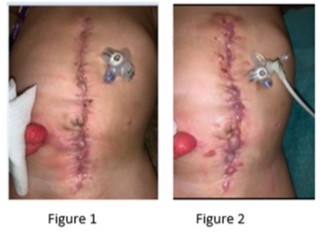Comparative Case Study of Mycobacterium Infections in Pediatric Post Intestinal Transplant
S. Yerina1, R. Kanthula1, Y. Rekhtman2, S. Kaufman1, U. Ekong1, N. Yazigi1, T. Fishbein1, A. Kroemer1, C. Matsumoto1, K. Khan1
1Transplant, Georgetown University Hospital, Washington, DC, 2GI and Nutrition, Prisma Health Midlands Children's Hospital, Columbia, SC
Meeting: 2022 American Transplant Congress
Abstract number: 1623
Keywords: Immunosuppression, Infection, Intestinal transplantation, Rejection
Topic: Clinical Science » Infection Disease » 24 - All Infections (Excluding Kidney & Viral Hepatitis)
Session Information
Session Name: All Infections (Excluding Kidney & Viral Hepatitis) IV
Session Type: Poster Abstract
Date: Tuesday, June 7, 2022
Session Time: 7:00pm-8:00pm
 Presentation Time: 7:00pm-8:00pm
Presentation Time: 7:00pm-8:00pm
Location: Hynes Halls C & D
*Purpose: We describe two rare and challenging post pediatric intestinal transplant cases with both Mycobacterium (M) Abscessus and Mycobacterium (M) Immunogenum in post surgical site incision and the steps necessary to manage these mycobacteria.
*Methods: In immunosuppressed patients, there is an increased risk of contracting the acid-fast bacilli (AFB) mycobacteria that grows in water sources at cool temperatures. M Abscessus is a rare, virulent and antibiotic/chemotherapy resistant member of the rapidly growing mycobacteria (RGM). Treatment guidelines are similar for M Immunogenum. Compared solely with antimicrobial medication treatment, surgical resection has provided the best outcome. No prior cases have been reported amongst pediatric intestinal transplant recipients. We describe two different cases and their respective diverging outcomes and include the steps necessary to manage RGM.
*Results: The first case is a 2-year-old female post intestinal transplant due to intestinal pseudo-obstruction. Two weeks post transplant, the patient developed purulent discharge and opening at the surgical site on her abdomen. Blood and wound culture resulted in positive growth for M Abscessus. Despite starting on linezolid and amikacin, the wound continued to progress. Three months post-transplant, she developed several soft and firm bumps along the surgical incision site (figure 1). They were surgically debrided and cultured and found to continue to test positive for M Abscessus in the fascia (figure 2). The patient had multiple abdominal debridements as well as medication adjustments of antibiotics and taper of immunosuppression. The second case is an 8-year-old male post intestinal/colon transplant that developed severe exfoliative graft failure three years post-transplant. He underwent explanation four years post-transplant and was found to have M Immunogenum first detected in JP drainage post-surgical explant. His antibiotic coverage included amikacin and azithromycin. Ultrasounds were repeated weekly, and two months post antibiotic treatment showed a near central resolution on imaging.
*Conclusions: Both M Abscessus and M Immunogenum are major challenges for patients after organ transplantation. Stopping immunosuppression is the most effective way to stop these organisms but is not possible in most circumstances. Aggressive medical management and/or debridement is necessary to otherwise control these organisms.
To cite this abstract in AMA style:
Yerina S, Kanthula R, Rekhtman Y, Kaufman S, Ekong U, Yazigi N, Fishbein T, Kroemer A, Matsumoto C, Khan K. Comparative Case Study of Mycobacterium Infections in Pediatric Post Intestinal Transplant [abstract]. Am J Transplant. 2022; 22 (suppl 3). https://atcmeetingabstracts.com/abstract/comparative-case-study-of-mycobacterium-infections-in-pediatric-post-intestinal-transplant/. Accessed February 25, 2026.« Back to 2022 American Transplant Congress

